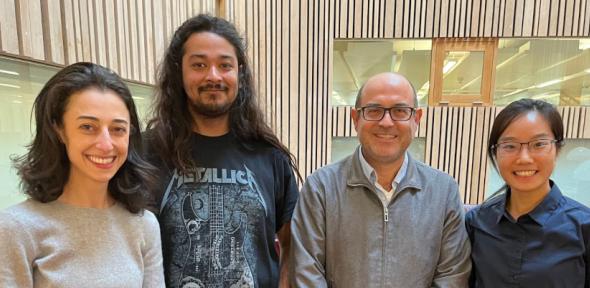
Submitted by Yolibeth López ... on Wed, 08/03/2023 - 18:52
Photo - left to right: Sabila Chilaeva, Udit Surya Saha, Kyriacos Leptos, Chi Ki Leung.
Research in stem cell biology requires knowledge and tools from several disciplines and in particular, from physics and biology. The Cambridge Centre for Physical Biology has been established to meet this need and recently selected Sabila Chilaeva (Cohort 2019) to participate in a 3.5-day workshop to develop her research ideas.
The workshop brought together academics from across the University and established a forum for them to exchange knowledge and skills and work together to address key outstanding questions in stem cell biology.
World leading scientists were at hand to provide advice and mentorship together with examples of their own research that has benefited from an interdisciplinary approach. This included Madeleine Lancaster from Laboratory of Molecular Biology, Cambridge who has developed organoids that have furthered our understanding of neurodevelopment and Kevin Chalut from Altos Labs who has discovered how the mechanical environments of stem cells influence their fate.
Sabila’s research is focused on understanding the molecular mechanisms of mRNA trafficking in Drosophila. Some of the mRNAs that Sabila works with are known to be essential for stem cell fate development. However, we do not yet understand how they function. To address this line of research, the live dynamics of these molecules would be valuable. The workshops provided Sabila with the opportunity to discuss this research goal with Kyriacos Leptos, Udit Surya Saha and Chi Qi Leung who have expertise in mathematical modelling and imaging. They developed an innovative proposal to track and visualise individual mRNA molecules. On the final day of the workshop they presented their proposal to an expert panel with the possibility of securing funds of up to £4,000. The panel was impressed by the proposal submitted by Sabila and her team and awarded them £4,000.

